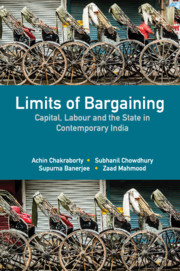Book contents
- Frontmatter
- Contents
- List of Tables
- List of Figures
- Preface
- 1 Contextualising Trade Unions and Collective Bargaining
- 2 Collective Bargaining in India: An Overview
- 3 Everyday Processes of Collective Bargaining in West Bengal
- 4 Industrial Stagnation due to ‘Labour Militancy’? A Critical Look at the Macro Evidence
- 5 Trade Unions and Working-Class Politics in Contemporary West Bengal
- 6 The State and Collective Bargaining
- 7 Conclusion
- References
- Index
4 - Industrial Stagnation due to ‘Labour Militancy’? A Critical Look at the Macro Evidence
Published online by Cambridge University Press: 05 June 2019
- Frontmatter
- Contents
- List of Tables
- List of Figures
- Preface
- 1 Contextualising Trade Unions and Collective Bargaining
- 2 Collective Bargaining in India: An Overview
- 3 Everyday Processes of Collective Bargaining in West Bengal
- 4 Industrial Stagnation due to ‘Labour Militancy’? A Critical Look at the Macro Evidence
- 5 Trade Unions and Working-Class Politics in Contemporary West Bengal
- 6 The State and Collective Bargaining
- 7 Conclusion
- References
- Index
Summary
The bargaining power of trade unions depends on a complex set of factors. In the last chapter, on the basis of our field-level data, we have underscored the importance of the triad of market, technology and the state in determining the outcome of the bargaining between labour and capital. In this chapter, we focus on the issue of the market, both labour and industry, in the context of West Bengal (WB), at the macro level.
The macroeconomic context within which the trade unions operate determines to a large extent whether the trade unions are successful in negotiating with the management in terms of fulfilling their demands. Marx had elaborated on the idea of the reserve army of labour and postulated how the varying size of the reserve army of labour results in variation in the wage rates. With a vast reserve army of labour, the wage rate is lower compared to a situation where the reserve army of labour is smaller in size. In the words of Marx, ‘the general movements of wages are exclusively regulated by the expansion and contraction of the industrial reserve army, and these again correspond to the periodic changes of the industrial cycle’ (Marx 2010). Thus, the Marxian argument postulates a negative relation between the wages and the size of the reserve army, which, in turn, depends on the ‘periodic changes of the industrial cycle’.
If we consider workers to be organised into trade unions as collective agents, then the wage rate of the workers becomes a negative function of the unemployment rate in the economy. In other words, if the unemployment rate, or the size of the reserve army of labour, is high, the bargaining power of the workers is low (Rowthorn 1977). Assuming that the unemployment rate is positively linked with periods of industrial stagnation or decline, it follows that the bargaining power of trade unions is negatively correlated with periods of industrial stagnation or decline. Therefore, if the macroeconomic environment within which the trade unions are functioning is that of the presence of a large reserve army of labour and a stagnant industrial situation, then it can be inferred that the bargaining power of the trade unions would be low in such an economy. It is well known that the state of WB has witnessed a steady relative industrial decline.
- Type
- Chapter
- Information
- Limits of BargainingCapital, Labour and the State in Contemporary India, pp. 50 - 74Publisher: Cambridge University PressPrint publication year: 2019



